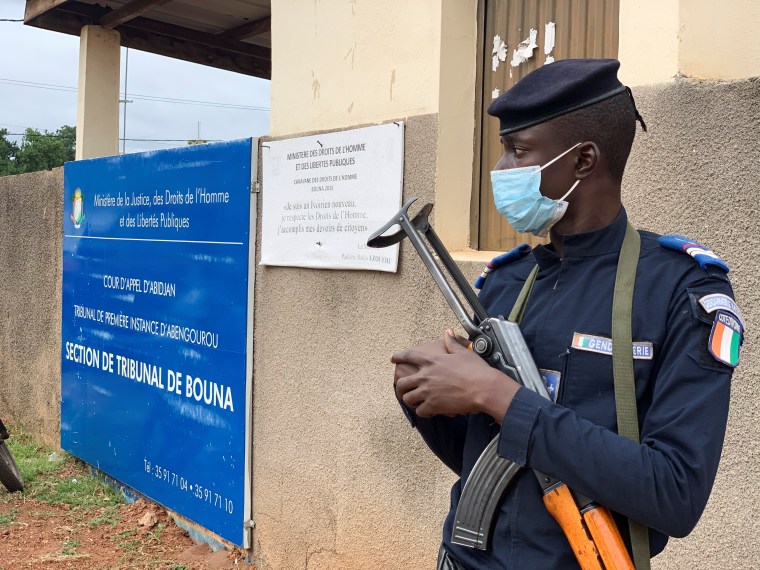On July 18, 2022, a court in Abidjan, the capital of Ivory Coast, convicted investigative reporter Noël Kouadio Konan of defamation under Article 89 of the country’s press law and fined him three million CFA francs (US$4,600) over a June 29 tweet, according to news reports and the journalist, who spoke to CPJ via messaging app.
Konan’s lawyer, Serge Yao Kouadio, told CPJ by phone that he filed an appeal of the court’s decision on July 20. If Konan fails to pay the fine, which was suspended by the appeal, the prosecutor could order his arrest, Kouadio said.
Under Article 89 of the press law, those convicted of defamation are not subject to detention or imprisonment for “offenses committed through the press or any other means of publication, subject to any other applicable legal provision.” The press law provides for a fine of between one and three million CFA francs (US$1,550-4,600).
Konan is a freelance journalist who covers corruption and governance issues, has contributed to the privately owned newspaper L’Elephant déchaîné, and publishes reporting on his Twitter account, where he has around 4,800 followers. In 2021, he participated in the “Pandora Papers,” an international investigation, with the International Consortium of Investigative Journalists.
A manager at the local Nouvelle Société Interafricaine d’Assurance (NSIA) Bank in Daoukro filed the defamation complaint on behalf of the bank on July 12, according to Konan. The June 29 tweet alleged that a group of thieves stole money from former Ivorian President Henri Konan Bédié, that an NSIA Bank branch in the central town of Daoukro was involved, and the director of that branch had been fired.
In a June 27 statement on its LinkedIn page, the General Management of NSIA Bank denied the allegations and said it “reserves the right to prosecute anyone who contributes in any way to the dissemination of such defamatory information about its business.”
According to the journalist, on June 30, the Daoukro bank manager told Konan that he would withdraw the defamation complaint if the journalist made another tweet clarifying that the manager was not involved in the alleged theft. Konan said he agreed and posted a second tweet.
On July 12, the branch manager of NSIA Bank in Daoukro requested that Konan meet with him and Bédié to talk about the first tweet, Konan told CPJ via messaging app. “I hesitated for a moment because I had not made any arrangements, but on insistence, I finally gave in,” Konan said. “He picked me up at the train station and sent me directly to a hotel where he had already booked the room.”
In the room, Konan was met by one of Bédié’s security guards and the Daoukro police commissioner, who questioned him for several hours about his source of information for the tweet, Konan told CPJ. Konan said he refused to reveal his source and before he was permitted to leave, the commissioner informed Konan that the bank manager had filed a defamation complaint against him and instructed the journalist to appear at the Daoukro police station the next day.
On July 13, Konan was summoned by the Platform for Combating Cybercrime (PLCC) branch of the Ivoirian police for “defamation on social networks,” the told CPJ. When he went to the Directorate of Information and Technological Traces (DITT), at a police station in Abidjan, in response to the summons, Konan’s phone was seized, he was questioned for over eight hours without a lawyer, and was held overnight, according to the journalist.
Police released Konan the next day, July 14, and his phone was returned to him, he said. Konan said police did not ask him for his phone password and he was not given any indication that his device had been accessed.
In 2017, Interpol trained West African law enforcement in Ivory Coast on the use of digital forensics technology designed to access and search phones, and provide participants with such technology, as CPJ documented.
The National Union of Press Professionals of Côte d’Ivoire (SYNAPP-CI) said in a July 14 statement that because of Article 89 of the press law, “no reason could explain the detention of a journalist in the performance of his duties.”
CPJ’s calls to Daoukro police and messaging app messages to Marie-Christelle Ouattara, a director of communication for NSIA Bank, did not receive any replies. CPJ messaged Romain Porquet, the protocol director for Bédié, via messaging app and was referred to security officer colonel Kadjo Adjoumani. Adjoumani told CPJ by phone that he did not know anything about Konan’s case.
